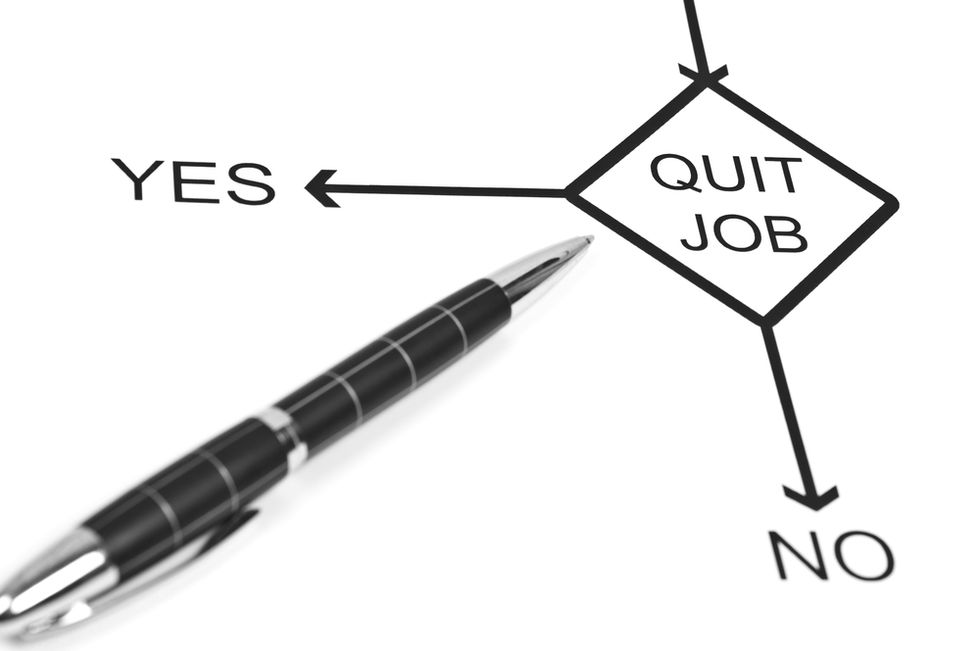
Congratulations! You’ve landed yourself a new job! You wowed them with your beautifully laid out CV, they loved your loquacious cover letter and couldn’t get enough of you in the interview. You accepted their offer and set off to work on your first day full of hopes and ambitions to boost the businesses success and build up your skills. But several weeks later, your initial drive has deflated. Like a helium balloon weeks after your birthday, you’re now metaphorically hovering several inches above the floor, not quite dejected but certainly not as enthusiastic as you were initially. You’re finding it harder to get out of bed every morning, and have begun to count down to five o’clock every day. You find yourself looking back at your old job – the one you hated - with nostalgia. Perhaps your new role didn’t turn out to be all you’d hoped for; maybe your ideas aren’t greeted with the same enthusiasm as you expected; you might not ‘gel’ with the other members of staff; the training and development that was promised in the interview hasn’t been mentioned since you started. But what should you do? Quitting this early on is not an option, you might be thinking. Maybe you’ve convinced yourself that this is just how it feels to be working full time, and once the initial excitement of change wears off all you’ve got to do is grin and bear it for the next fifty years until you can retire. Well, I’m here to encourage you to rethink. The first few months of a job are all about finding out if you fit in with the company, the type of work and the staff. If you find that any of these aren’t right for you, you have every right to pursue other avenues. Employers understand that there is a risk that the fit might not be right, and will most likely respect you for having the courage to speak up. You might often find that they have been thinking the same thing themselves, as they want to find someone that fits the role and is happy in their work. A lot of young people that are relatively new to the job market are afraid to leave a job early on for fear of seeming like a quitter. They worry that their CV will be compromised if they have string of short term job roles, and this often holds them back from leaving a job they are not satisfied with. They worry that the stigma attached to leaving a job soon after starting could hold them back in future interviews. Desire to build skills in order to improve employability is a big reason for staying put, as is fear of receiving a bad reference from a manager. There is also the nagging fear that you might not be able to find another job, and could end up unemployed for a long period of time. But these fears shouldn’t hold you back. Firstly, “Job hopping” as it is often colloquially referred to, no longer has the same stigma attached to it as it did a decade ago. Employers are more accepting of people who have worked numerous jobs in varying fields, and often it is seen as a benefit rather than a drawback, as it means you have most likely built a wider range of transferrable skills, and also shows that multiple employers deemed you good enough to work for them. You can work “job hopping” to your advantage at future interviews by explaining that you are keen to find a working environment that you fit in to in order to work to your full potential. You could explain that you wanted to try several career paths early on so that you knew you were making the right decision. For generation Y the desire to start a successful career is not as pressing as it was for their parents, so don’t dismay if you compare yourself to where your Dad was when he was your age – circumstances were very different then. As for worrying about a bad reference – employers aren’t legally allowed to give a bad reference, and if you worked hard and explained your reasons for leaving in a professional manner, you have no reason to fear the wrath of the manager you left behind. Lastly, the worry that leaving your current job could equal months of unemployment is of course a risk, but if you’re driven enough there is no reason you won’t find work, even in today’s uneasy job market. Sometimes risks need to be taken. Of course I am not telling you to hand your notice in tomorrow if you aren’t completely satisfied with their new job. There is always a learning curve when beginning a new venture, and learning new skills with people you aren’t familiar with can be daunting at first. Nor can many people truthfully state that they enjoy every aspect of their job; there will no doubt be some tasks that you dislike. The decision to quit should not be taken lightly. I would recommend looking at the job logically; if the cons outweigh the pros and you can’t imagine yourself working there in the future, it might be time to consider moving on. Quitting a job that isn’t right for you is a lot like ending a relationship you’re not happy with anymore. Why force both parties to put up with something they aren’t completely satisfied with for the sake of convenience? You are going to be working for a large percentage of your life, so finding a position that you not only enjoy, but that challenges you to learn and build new skills is very important. Quitting a job you aren’t happy with doesn’t make you quitter – on the contrary it shows that you have the courage and ambition to pursue a job that you really want, rather than settling for second best. You never know, there could be another more suitable job opportunity out there that you’re missing out on whilst dragging your feet to a job you don’t like.

 Bigstock
Bigstock Bigstock
Bigstock Bigstock
Bigstock


